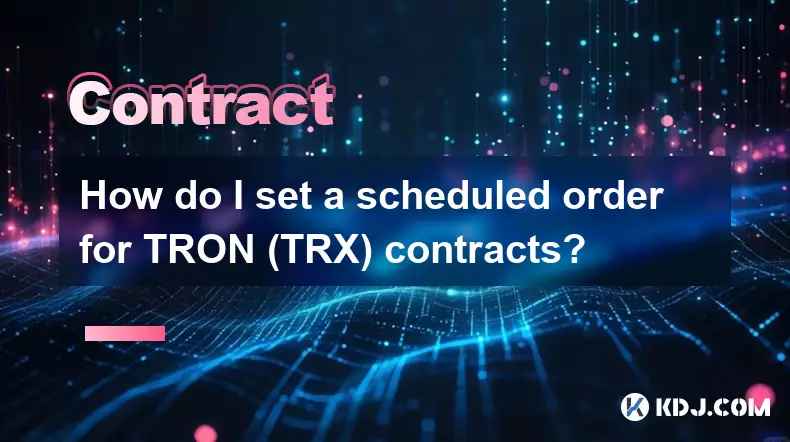-
 bitcoin
bitcoin $87959.907984 USD
1.34% -
 ethereum
ethereum $2920.497338 USD
3.04% -
 tether
tether $0.999775 USD
0.00% -
 xrp
xrp $2.237324 USD
8.12% -
 bnb
bnb $860.243768 USD
0.90% -
 solana
solana $138.089498 USD
5.43% -
 usd-coin
usd-coin $0.999807 USD
0.01% -
 tron
tron $0.272801 USD
-1.53% -
 dogecoin
dogecoin $0.150904 USD
2.96% -
 cardano
cardano $0.421635 USD
1.97% -
 hyperliquid
hyperliquid $32.152445 USD
2.23% -
 bitcoin-cash
bitcoin-cash $533.301069 USD
-1.94% -
 chainlink
chainlink $12.953417 USD
2.68% -
 unus-sed-leo
unus-sed-leo $9.535951 USD
0.73% -
 zcash
zcash $521.483386 USD
-2.87%
How do I set a scheduled order for TRON (TRX) contracts?
TRON smart contracts can't natively schedule functions; they rely on external services like Chainlink Keepers or custom bots to trigger time-based actions.
Sep 23, 2025 at 10:01 pm

Understanding Scheduled Orders in TRON (TRX) Contracts
Scheduled orders in the context of TRON (TRX) smart contracts refer to automated executions of specific functions at predetermined times or block heights. Unlike centralized exchanges that offer built-in scheduling tools, TRON relies on decentralized mechanisms to achieve time-based triggers. These are not native features of the TRON Virtual Machine (TVM), so developers must implement workarounds using external services or on-chain logic.
1. TRON does not support cron-like scheduling directly within its blockchain infrastructure.
- Smart contracts on TRON execute only when triggered by an external transaction.
- To simulate scheduled execution, a third-party service must send a transaction to invoke the contract function at the desired time.
- This dependency means reliability hinges on the uptime and trustworthiness of the triggering service.
- Common solutions include blockchain automation platforms such as Chainlink Keepers or custom off-chain bots.
Tools and Services for Triggering TRON Contract Functions
Several decentralized and centralized tools enable timed interactions with TRON smart contracts. These act as external executors that monitor time or block conditions and submit transactions accordingly.
1. Chainlink Automation (Keepers) can be integrated with TRON-based dApps through cross-chain configurations, allowing condition-based or time-based job execution.
- Custom bots written in Node.js or Python can use TronWeb to listen for specific timestamps and broadcast transactions automatically.
- Third-party scheduling platforms like Gelato Network offer support for EVM-compatible chains; while not natively supporting TRON, similar models can inspire TRON-specific implementations.
- Cronos or Taskfile scripts running on secure servers can trigger TronWeb calls based on system-level cron jobs.
- Decentralized oracle networks are being explored to bring trustless automation to non-EVM ecosystems like TRON.
Implementing Time-Based Logic in TRON Smart Contracts
While the execution trigger must come from off-chain sources, the smart contract itself can enforce timing rules to prevent premature or invalid calls.
1. Use block.timestamp within Solidity-style TRON smart contracts to validate whether the current time meets the required condition.
- Define a function modifier that checks if the current block time is greater than or equal to the scheduled execution time.
- Store scheduled execution parameters (time, recipient, amount, etc.) in contract state variables.
- Ensure only authorized addresses or automated services can call the execution function to maintain control.
- Emit events upon successful execution to allow external systems to log or verify activity.
Security Considerations for Automated TRON Transactions
Automating contract interactions introduces risks related to key management, service reliability, and contract vulnerabilities.
1. Private keys used by scheduling bots must be stored securely, preferably in hardware security modules (HSMs) or encrypted vaults.
- Contracts should include reentrancy guards and input validation to prevent exploitation during automated calls.
- Implement rate limiting or cooldown periods to avoid abuse even from authorized executors.
- Monitor failed transactions due to network congestion or insufficient energy, which may disrupt scheduling accuracy.
- Regularly audit both the smart contract code and the external execution environment for potential flaws.
Frequently Asked Questions
Can I schedule a TRX transfer directly from my wallet without coding?No direct wallet-level scheduling exists for TRX transfers. Users must rely on dApps or custom scripts to automate transactions. Some advanced wallets may integrate bot services, but these are exceptions rather than standard features.
Is it possible to use Ethereum-based automation tools for TRON contracts?Not directly. Ethereum-centric tools like Gelato or Chainlink Keepers operate on Ethereum’s network architecture. However, their design principles can be adapted to TRON using TronWeb and compatible node endpoints.
What happens if the scheduled time passes and no one triggers the contract?The function will remain unexecuted until someone sends a valid transaction that satisfies the time condition. There is no automatic rollback or notification unless explicitly coded into the contract logic.
Are there any TRON-native protocols offering built-in scheduling?As of now, no official TRON protocol provides native scheduling. The community is developing decentralized task runners, but widespread adoption has yet to occur. Most implementations remain project-specific or experimental.
Disclaimer:info@kdj.com
The information provided is not trading advice. kdj.com does not assume any responsibility for any investments made based on the information provided in this article. Cryptocurrencies are highly volatile and it is highly recommended that you invest with caution after thorough research!
If you believe that the content used on this website infringes your copyright, please contact us immediately (info@kdj.com) and we will delete it promptly.
- Ilocos Norte's Vibrant Festival Immortalized on New P100 Coin by BSP
- 2026-02-02 21:55:01
- The Warsh Effect: Bitcoin Takes a Dive as Fed Nominee Sparks Crypto Wipeout
- 2026-02-02 22:05:01
- Your Pocket Change Could Be Gold: Spotting the Valuable £2 Coin Error
- 2026-02-02 22:40:02
- ZAMA Token Launches Globally, Ushering in a New Era for Confidential Blockchains
- 2026-02-02 22:40:02
- LBank Elevates DeFi with GOLDEN FI (GLINK) Listing, Bridging Real-World Assets to the Blockchain
- 2026-02-02 21:30:02
- US Investors Pull Billions from Crypto Funds Amidst Shifting Sentiment, CoinShares Report Highlights
- 2026-02-02 22:35:00
Related knowledge

How to close a crypto contract position manually or automatically?
Feb 01,2026 at 11:19pm
Manual Position Closure Process1. Log into the trading platform where the contract is active and navigate to the 'Positions' or 'Open Orders' tab. 2. ...

How to understand the impact of Bitcoin ETFs on crypto contracts?
Feb 01,2026 at 04:19pm
Bitcoin ETFs and Market Liquidity1. Bitcoin ETFs introduce institutional capital directly into the spot market, increasing order book depth and reduci...

How to trade DeFi contracts during the current liquidity surge?
Feb 01,2026 at 07:00am
Understanding Liquidity Dynamics in DeFi Protocols1. Liquidity surges in DeFi are often triggered by coordinated capital inflows from yield farming in...

How to use social trading to copy crypto contract experts?
Feb 02,2026 at 07:40am
Understanding Social Trading Platforms1. Social trading platforms integrate real-time market data with user interaction features, enabling traders to ...

How to build a consistent crypto contract trading plan for 2026?
Feb 02,2026 at 10:59pm
Defining Contract Specifications1. Selecting the underlying asset requires evaluating liquidity depth, historical volatility, and exchange support acr...

How to trade micro-cap crypto contracts with high growth potential?
Feb 01,2026 at 02:20pm
Understanding Micro-Cap Crypto Contracts1. Micro-cap crypto contracts refer to derivative instruments tied to tokens with market capitalizations under...

How to close a crypto contract position manually or automatically?
Feb 01,2026 at 11:19pm
Manual Position Closure Process1. Log into the trading platform where the contract is active and navigate to the 'Positions' or 'Open Orders' tab. 2. ...

How to understand the impact of Bitcoin ETFs on crypto contracts?
Feb 01,2026 at 04:19pm
Bitcoin ETFs and Market Liquidity1. Bitcoin ETFs introduce institutional capital directly into the spot market, increasing order book depth and reduci...

How to trade DeFi contracts during the current liquidity surge?
Feb 01,2026 at 07:00am
Understanding Liquidity Dynamics in DeFi Protocols1. Liquidity surges in DeFi are often triggered by coordinated capital inflows from yield farming in...

How to use social trading to copy crypto contract experts?
Feb 02,2026 at 07:40am
Understanding Social Trading Platforms1. Social trading platforms integrate real-time market data with user interaction features, enabling traders to ...

How to build a consistent crypto contract trading plan for 2026?
Feb 02,2026 at 10:59pm
Defining Contract Specifications1. Selecting the underlying asset requires evaluating liquidity depth, historical volatility, and exchange support acr...

How to trade micro-cap crypto contracts with high growth potential?
Feb 01,2026 at 02:20pm
Understanding Micro-Cap Crypto Contracts1. Micro-cap crypto contracts refer to derivative instruments tied to tokens with market capitalizations under...
See all articles










































































